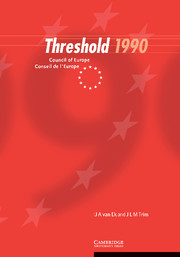Book contents
- Frontmatter
- Contents
- Preface
- Introduction
- 1 The objective: levels of specificity
- 2 The objective: general characterisation
- 3 The objective: extended characterisation
- 4 The objective: components of the specification
- 5 Language functions
- 6 General notions
- 7 Specific notions
- 8 Verbal exchange patterns
- 9 Dealing with texts: reading and listening
- 10 Writing
- 11 Sociocultural competence
- 12 Compensation strategies
- 13 Learning to learn
- 14 Degree of skill
- APPENDICES
7 - Specific notions
Published online by Cambridge University Press: 26 February 2010
- Frontmatter
- Contents
- Preface
- Introduction
- 1 The objective: levels of specificity
- 2 The objective: general characterisation
- 3 The objective: extended characterisation
- 4 The objective: components of the specification
- 5 Language functions
- 6 General notions
- 7 Specific notions
- 8 Verbal exchange patterns
- 9 Dealing with texts: reading and listening
- 10 Writing
- 11 Sociocultural competence
- 12 Compensation strategies
- 13 Learning to learn
- 14 Degree of skill
- APPENDICES
Summary
Introduction
In the following list the specific notions for Threshold Level are arranged under 14 themes:
personal identification
house and home, environment
daily life
free time, entertainment
travel
relations with other people
health and body care
education
shopping
food and drink
services
places
language
weather
The themes may relate to the situational context in which particular transactions may take place (e.g. buying something in a shop) as well as to topics for communicative interaction (e.g. talking about shopping facilities). Under the title of each theme an indication is given as to what learners at Threshold Level may be expected to be able to do with regard to it. These indications are necessarily incomplete and are to be supplemented from other components of our specification.
To facilitate reference, the specific notions are further arranged under sub-themes. In the same way as the general notions, the specific notions are indicated by means of their (recommended) exponents (see the introduction to the list of general notions). Alternative exponents of essentially the same notion are presented thus: first name/Christian name/forename/given name. In such a case the learner should be able to use at least one of them productively but to understand all the others.
The specification contains several open-ended items indicated by italics (e.g. names of occupations). In these cases we leave it to materials designers, teachers and learners to identify those specific notions, if any, which suit their own purposes.
- Type
- Chapter
- Information
- Threshold 1990 , pp. 59 - 81Publisher: Cambridge University PressPrint publication year: 1998



